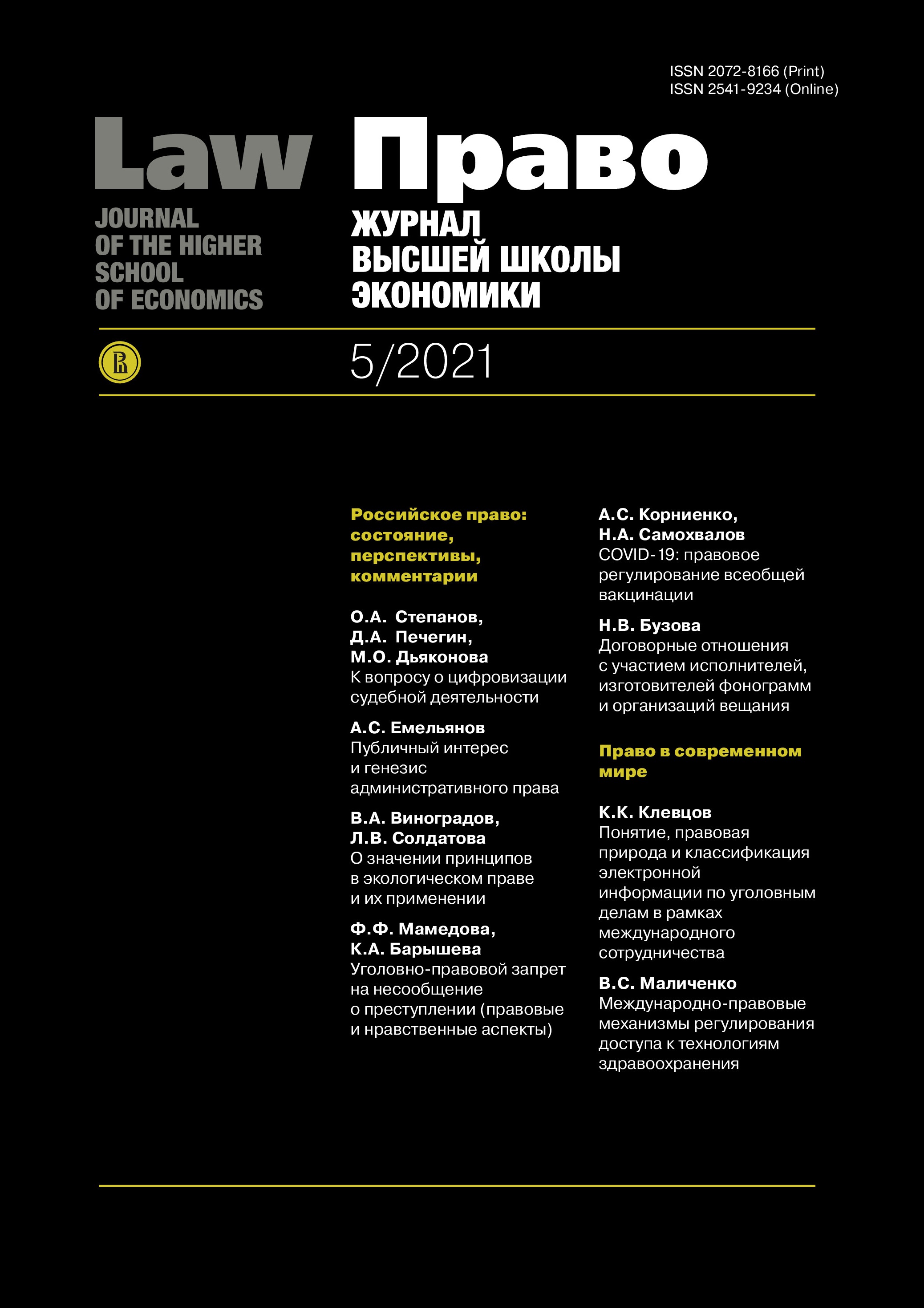On the Meaning of Principles in Environmental Law and Their Application
Abstract
New norms of law are created in response to the emergence of the need to regulate certain relations. We are not only improving, modifying the existing mechanism of nature management, but also developing completely new legal instruments and methods of environmental protection, which is associated with the risk of not achieving the set goal. Legislative activity, like law enforcement, cannot be carried out haphazardly, the basis is necessary, as well as an understanding of the essence of relations, the basic laws of their development and the goals of regulation itself. The principles of law fulfill this function. They help to prioritize, determine the direction of regulation, and select the relevant methods of legal impact. The presence of problems in the field of legal regulation of environmental relations makes us think about the correctness of building a regulatory framework, the effectiveness of legal mechanisms, which was the purpose of the study. And since environmental law is constantly changing, the reason for inefficiency lies, among other things, in the absence of a unified system of principles of environmental law and environmental legislation. Consideration of scientific sources, Russian and foreign, allows us to state the fundamental role of the law principles, they are irreplaceable in judicial practice. The principles of law play an exclusive role in international environmental law. To determine the role of the principles of environmental law, in addition to studying doctrinal sources, the court practice was analyzed in more than 400 cases, including claims for compensation for environmental damage and protection of the right to a healthy environment. The study showed that the further development of relations in the field of environmental protection requires the construction of a unified system of principles. The legislator and the applicants of law sometimes, even on an intuitive level, are forced to resort to the principles of law. The high courts rely on the principles of environmental law in the formation of uniform judicial practice and interpretation of the norms of environmental law. So far, this is of an irregular, but rather exceptional nature. In order to increase the productivity of the current legislation, we will work hard to determine the content of the principles, their relationship to each other and the possibility of application.
References
Agafonov A.V. (2017) International legal protection of the environment. Estestvenno-gumanitarnyye issledovaniya = Natural-Humanitarian Studies, no. 2, pp. 13-17. (In Russ.).
Alekseev S.S. (1975) The structure of Soviet law. Moscow: Yuridicheskaya literatura, 264 p. (In Russ.).
Baytin M.I. (2000) On principles and functions of law: new moments. Pravovedeniye = Legal Studies, no. 3, pp. 4-16. (In Russ.).
Bergel J.-L. (200) General theory of law. Moscow: Nota Bene, 573 p. (In Russ.).
Bogdanovskaya I.Yu. (2010) Evolution of judicial precedent in “common law”. Pravo. Zhurnal Vysshey shkoly ekonomiki=Law. Journal of the Higher School of Economics, no. 2, pp. 75-87. (In Russ.).
Bogolyubov S.A. (2011) Problems of environmental law. Moscow: Yurayt, 607 p. (In Russ.).
Chacón M.P. (2019) The Road Toward the Effectiveness of Environmental Law. Seqüência, no. 83, pp. 87-95.
Cherdantsev A.F. (2001) Theory of State and Law. Moscow: Yurayt, 429 p. (In Russ.).
David R. (1988) Basic legal systems of our time. Moscow: Progress, 496 p. (In Russ.).
Lavrus S.Yu. (2005) Realization of the principles of law in legal practice. Candidate of Juridical Sciences Thesis. Samara, 211 p. (In Russ.).
Lazarev V.V. (1974) Legal gaps and ways to eliminate them. Moscow: Jurist, 184 p. (In Russ.).
Lukasheva E.A. (1970) Principles of socialist law. Sovetskoe gosudarstvo i pravo=Soviet state and law, no. 6, pp. 22-23. (In Russ.).
Matuzov N.I., Malko A.V. (2021) Theory of State and Law. Moscow: Delo, 528 p. (In Russ.).
Muromtsev G.I. (1992) Sources of law: Theoretical aspects of the problem. Pravovedeniye = Legal Studies, no. 2, pp. 23-30. (In Russ.).
Nikolic D. (2019) Directions in the development of environmental law. Proceedings of the Faculty of Law in Novi Sad, issue 82, pp. 66-67. (In Serb.).
Ojeda Mestre R. (2003) The hundred faces of environmental law. Environment and Law: Electronic journal of environmental law, no. 9, pp. 3-5. (In Spanish).
Shesteryuk A.S. (2000) Environmental law: problems of methodology. Doctor of Juridical Sciences Summary. Saint Peterburg, 38 p. (In Russ.).
Vasiliev A.M. (1975) Legal ideas-principles. Sovetskoe gosudarstvo i pravo = Soviet state and law, no. 3, pp. 64-78. (In Russ.).
Yastrebov A.E. (2013) The main directions of improving the environmental legislation of the Russian Federation. Srednerusskiy vestnik obshchestvennykh nauk = Central Russian Herald of Social Sciences, no. 1, pp. 142-146. (In Russ.).
Copyright (c) 2021 Law Journal of the Higher School of Economics

This work is licensed under a Creative Commons Attribution-ShareAlike 4.0 International License.


















